Displaying items by tag: Peter Malone's Movie Reviews
Sing Sing
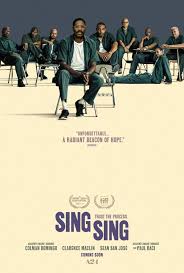
SING SING
US, 2023, 107 minutes, Colour.
Coleman Domingo, Clarence Maclin, Sean San Jose, Paul Raci.
Directed by Greg Kwedar.
Sing Sing is one of the United States most well-known prisoners, in upstate New York, on the Hudson River. And it featured in early films, 20,000 years at Sing Sing with Spencer Tracy and Bette Davis in the 1930s and subsequent locations for various prison thrillers.
This is not that kind of film.
For some time at Sing Sing, there was a program RTA, Rehabilitation through the Arts. This Is what this film Is about, a focus on the prisoners themselves, their response to Theatre, the effect on them personally, for morale in the prison. It was based on an article of 2005 in Esq magazine, written by John Whitfield who is the central character of this film. (In 2005 there was a documentary, set in California, Shakespeare Behind Bars, with the same theme.)
Of course, there are some scenes in the yard, the sudden siren and prisoners having to prostrate themselves, some focus on the cells some harassment of guards ransacking belongings in cells… But, the perspective of this film is very positive.
The principal feature is the fact that most of the cast consists of actual prisoners from the past or the present, re-acting what they lived through with this theatre rehabilitation. On face value, literally, they don’t seem likely candidates for drama but tough, one with a tattooed face, mainly African-Americans, in fact. They enter into this film with great zest, the discussions, exploring their characters, discussing whether to put on comedy or drama, finally opting for comedy.
But, at the centre, is the character of Whitfield himself, wrongly convicted, long time in prison, turned down by parole boards, but writing creatively, plays for the prisoners, part of the steering committee for the theatre group, coaching, acting. And along with him is the director, who comes from outside, long time working with the prisoners, writing the plays, some powerful scenes where he trains them, directs them in movement, has some quietly closing their eyes, contemplating memories of a friend, encourage and to express what they have seen and felt.
There are two other prisoner characters, a great friend of Whitfield, following him around, full of enthusiasm and suggestions. His played by an actor, Sean San Jose. The other principal character is the former prisoner, Clarence Maclin, replaying his own experiences, drug dealing in the yard, any demands from the dealer, it interested in the theatre, initial clashes with Whitfield but forming a bond, the audience understanding the impact of the rehabilitation through watching him, his Hamlet soliloquy, the director urging him to intensity, his moods, his developing a relationship with Whitfield, support for him when Whitfield breaks after an interview with the parole board.
Colman Domingo has won many awards for his portrayal of Whitfield, many nominations including Golden Globe and Oscar. For this reviewer, the film could have been longer, more development of the prisoner characters in themselves, more scenes of rehearsals and performance. But, Domingo holds it together on the whole project is, of course, a most worthy cause.
- Audience knowledge of Sing Sing, prison, history, eye security, guards and administration? This film’s focus on the group of prisoners, and the work of Rehabilitation through the Arts?
- The views of the prison, outside, the Hudson, trains? Inside, the yards, the cells, rehearsal rooms, theatre? Musical score, final song?
- Nominations for awards, Coleman Domingo’s performance, the professional members of the cast, most of the cast as former prisoners, prisoners, reliving their experiences?
- The atmosphere of the prison, comparative freedom for the theatre group? Scenes in the cells, sharing, discussions, conditions? Harassment of the prisoners, sirens and falling to the ground in the yard, visiting the cells and wrapping them up…?
- The film based on the reality of the Rehabilitation for the Arts, John Whitfield's article Esq, 2005? His story? Long years in prison, meetings with the Parole Board, the focal meeting, the documents, the accusations, the lack of evidence, the crime, his innocence, the phone call to his mother? His children? His career in writing, the players, the performances?
- The introduction to the range of prisons, their appearance, characters, actual prisons and experience, the use of their audition videos in the film? Their interest in theatre, the discussions, the steering committee, discussion about drama or comedy, the interchanges, the initial visuals of their performance at the credits, the audience interest in what they could achieve?
- The director, his working with the group, his personality, encouragement, they’re welcoming him? The discussion about the play, the comedy, the range of ideas, from Hamlet to Freddy Krueger, his going away, writing a text, bring it to them, their responses? The scenes of him training them, walking, shooting their eyes and imagining, communicating their images?
- Clarence Maclin, in the yard, the drugs, the young man, the bad drugs, $500? His relationship with Whitfield? The nicknames of Divine? The gradual bonding, the discussions, the issue of Hamlet’s soliloquy? Macon and his attitudes, with the group, surly, gradually harmonising, succeeding, his encouragement to be intense with the soliloquy? The later scenes, the discussions with Whitfield, sitting with him, supporting him, helping Whitfield come out of himself? Final performances?
- The character of Mike Mike, professional actor, sharing with Whitfield, their discussions, following him round, ideas, creativity, his loss with the group, their response?
- Whitfield, his character, strengths, moments of depression, intervening, encouraging? The bond with Mike Mike? With Maclin? The impact of the board meeting? The documents, Maclin and his being able to leave?
- The rehearsals, the costumes, performance, happiness, the absurdity of the play, the women coming in for their roles? The director? Whitfield and his interruption, disastrous, the reactions?
- Whitfield persuaded to come back, the performance, the success – and the collage of sequences, especially drawing on those from the actual past?
- Whitfield, quiet, reflecting, his leaving, meeting with Maclin, the exhilaration of freedom?
Julie Keeps Quiet
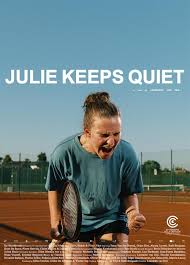
JULIE KEEPS QUIET
Belgium, 2024, 100 minutes, Colour.
Tessa Van den Broek, Grace Biot, Noah Leclloux, Claire Bodson, Pierre Gervais..
Directed by Leonardo Van Dijl.
A significantly topical theme.
In recent years, issues have been raised about the relationship between sports coaches and their athletes, especially inappropriate behaviour, even harassment and abuse. This film takes of this theme in the context of a high school and specialist training for a tennis star.
The duly of the title is a teenager, working hard at school, popular with the other students, conscientious about her work. She is completely dedicated to tennis, training and exercise, with hopes for future selection. However, she has her quiet and taciturn moments.
The film has a great number of tennis sequences, tennis practice, exercises, immersing the audience in Julie’s world of horizons.
But, an investigation has been raised about her former coach. There are meetings with the head of the Department, discussions with her parents, but Julie being reticent. She also meets up with the former coach with there is the revelation as he explains to her that he stopped when she asked him to stop.
There is tension with the new coach, her wariness, but a gradual acceptance of him. There is the complication that one of her previous coaches students committed suicide.
This is a film of the emotions and talk rather than any explicit sequences of flashbacks, focusing on the investigation, the behaviour of the coach, the response of the students and the effect on Julie.
- The topical theme? Athletes, trainers, relationships, behaviour, harassment, abuse? The Belgian setting, universal? The school, classrooms, the tennis courts, practice, competition? Classes, schoolfriends, travel for tournaments? The tennis atmosphere?
- The significance of tennis, the impact for tennis fans, non-tennis fans, the initial practice, the focus on Julie, the ball, her returns, serving, multi-courts and the players, the coaches, the spectators, in the background of physical exercises – even to the final credits and Julie’s final push-ups and at rest? The musical score?
- Julie, her age, seeing her first tennis, sing her with her parents, her father support, the role of Jeremy, his coaching her, encouragement, his seeing her talent and possibilities, his withdrawal, the discussions with the head, the issues of the investigation, her seeming to ignore them, her clashes with the new coach, gradually accepting him, his highlighting her with the others, her serve? The trouble to the tournament, successful, the relationship with the other students? In as and her rich family and demanding refunds? Laura and the confidentiality? And the story of the suicide and suspicions concerning Jeremy?
- The management, the meetings, the discussions, the investigation, Jeremy suspended?
- Julie meeting with Jeremy, her relying on him, his skill in coaching, his ambitions for her, the details of advice, the revelation of the relationship and his stating that he stopped when Julie asked him to stop? The repercussions of this experience for her? And the story of Aileen, her promise, Jeremy, her death?
- The portrait of the youngsters, in class, tennis, their friendships, discussions?
- The title, the focus on the victim, not wanting to communicate, self-isolation? And the need for further steps?
Sad Jokes
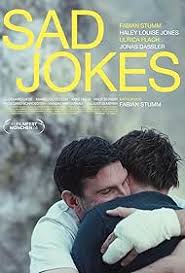
SAD JOKES
Germany, 2024, 96 minutes, Colour.
Fabian Stumm, Hayley Louise Jones, Justus Meyer, Ulrica Flach, Jonas Dassler.
Directed by Fabian Stumm.
Sad jokes is an evocative title, especially when the first few minutes of the film offering a range of characters telling said jokes, corny jokes, pun jokes.
But, this is a story of Joseph, and gay filmmaker, played by Fabian Stumm who has written, directed, starred in this film. After the success of his first film, he has discussions with the producer about making a comedy, the producer somewhat sceptical, asking what kind of comedy, Joseph floundering – but, this film itself probably the equivalent of what he was proposing, sadness and humour.
Joseph his co-raising a little boy, the son of Sonya, prone to depression and spending time in institutions. But Joseph relishes his time as the boy’s father and bonds with him. There are some neighbours, characters, who support him in trying to help Sonya. Sonya has some vivid scenes, frantic in the kitchen, going back to the institution, but emerging and a powerful sequence where she relates a therapy experience in imagining and telling a story, indicating hopes for the future.
Which means that this is a different kind of domestic comedy with serious overtones. And, probably reflecting some of the experiences of Fabian Stumm in his filmmaking career.
- The title, the comedy aspects, the same human aspects? In the opening with the range of jokes told and audience response? The mood?
- The German setting, German humour, German sadness?
- Joseph’s story, Fabian Stumm and his writing, performing, directing? Character and personality, gay man, breaking up with the partner, the later encounter and their conversation, his partner moving on? His relationship with Sonja? Her pregnancy, the birth of the boy? The Platonic relationship, bringing up the boy together? His happiness in being a father? The scenes together? His work as a filmmaker, his success, the discussions with his producer, discussions about the film is set in filmmaking, the prospects for the future, his wanting to do a comedy, the producer asking what kind of comedy, his presenting the manuscript, the producer not finding it funny?
- This film itself is the equivalent of Joseph’s proposal for the comedy, idiosyncratic humour, serious themes?
- Sonia, the depression, in the institution, getting out, at home, frantic behaviour, the cooking, with her son, Connie and Alice and their supporting Joseph? Her going back to the institution? The later visit, karma, her April to discuss the situation, the telling the story of the therapy, imagining the situation, open to change?
- The neighbours, Connie and Alice, characters, the subplot of their lives, their support for Joseph?
- The boy, his age, with each of his parents, his situation, vitality?
- Joseph, the art class, the men posing, the later contact, the message, Joseph responding, it is tension, the man moving off?
- Joseph and the success of this film, the prospects for future film? And the prospects of his life, a combination of sadness and jokes?
Flight Risk
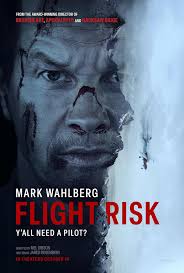
FLIGHT RISK
US, 2025, 91 minutes, Colour.
Michelle Dockery, Topher Grace, Mark Wahlberg, Maaz Ali, Paul Ben-Victor.
Directed by Mel Gibson.
Best to consider first the issue of Mel Gibson, his reputation, personal, as a filmmaker. Many audiences react against Mel Gibson because of his strong views, his anti-Semitic outbursts in the past. (Catholic audiences are probably dismayed by his extreme views about the church, tradition, the inheritance from his father’s Conservative stances but will still go to see and even enjoy his films!).
In fact, Mel Gibson is an Oscar-winning director with Braveheart. He also directed Apocalypto and Hacksaw Ridge which have strong reputations. And, of course, there is The Passion of the Christ.
This 90 minute action show is a long way from these films. Gibson said he wanted to make it for sheer entertainment and that is what it offers. It is reminiscent of a number of films but that is the nature of the popular action show.
While Mark Wahlberg has top billing, above the title, the main strength of the film is with Michelle Dockery, Madolyn, taking some time off from Downton Abbey. She is an officer who has allowed someone to die on her watch and has been suspended, given the opportunity for rehabilitation, going to Alaska to apprehend a key witness against a violent financial criminal. The witness is Winston, played by Topher Grace, a timid desk person but shrewd in his management of money, incessantly chatty, but with the possibility of some kind of redemption and witness protection.
The bulk of the film takes place in the air during a flight across Alaska to Anchorage. Mark Wahlberg plays the good old boy pilot, even having the top of his head shaved which makes him seem more eerie! And, it very quickly emerges that he is not what he seems and, in fact, is a hired killer.
Which means then that there are lots of complications during the flight, guns, knives, but, especially, effective tasering. The plane is rickety, the mountain peaks ominously looming, Madolyn having to fly the plane, on automatic, getting guidance from an official who is flirtatious while giving his advice. Then there is the question of a leak in the department, suspicion on Madolyn’s contact, on her boss, and the taunts of the hitman pilot.
And, there is always the excitement of the crash landing.
Most entertainment action films are made up of elements that we are familiar with but with some variations. Same here.
- Expectations of Mel Gibson film? Of an action film? Action in the plane?
- The Alaskan settings, the town, the mountains, the city, the tarmac…? The musical score?
- Situation, Winston, his background, accounting, doing deals for criminals, under threat? Hiding in Alaska? His personality, chatter, his mother, fearful? Wanted as a witness?
- Madolyn, her history, the person killed under her watch, suspended, invited back, determined, the confrontation with Winston, taking him in? The plane flight to New York? Her contact with Janine through phone? Some suspicions of her? Contact with Coleridge the boss? The discovery of the truth? The ruthlessness, Janine’s death?
- The plane, the pilot, Mark Wahlberg, jovial old boy, the bald head? The chatter, the blood? Madolyn realising the truth, pulling the gun, the struggle, Tasering him? The reality of his being a hit man, knowing all about her, taunting her? The fights, tying him up, the spectacles, cutting loose? His personality, taunting?
- The pilot loose, the fight, Winston and the knife, his being stabbed?
- Madolyn, using her wits, strength, talking with Winston, the threats to him, untying him? The personal story, his mother? Autopilot? Talking with Janine, talking with Coleridge? The discussions with Hasan, jovial, flirting, his helping her land?
- The dramatic issues, the fights, the mountains, fuel diminishing, the landing, the wind, the crashing, the pilot thrown out, run over by the vehicle?
- Landing, the hospital for Winston, her meeting Hasan? The threats by Coleridge, her recording them? Vindication?
Den of Thieves: Pantera
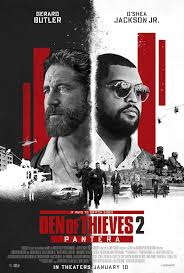
DEN OF THIEVES 2: PANTERA
US, 2025, 130 minutes, Colour.
Gerard Butler, O'Shea Jackson Jr,Evin Ahmad, Salvatore Esposito.
Directed by Christian Gudegast.
In 2018 audiences enjoyed Den of Thieves, the pairing of O’Shea Jackson Jr (son of Ice Cube) and Gerard Butler, one criminal, one police, all kinds of intrigues and manoeuvres, involvement in elaborately planned robberies.
So, here is an opportunity to revisit, relive the enjoyment of the first film and more elaborate robberies and setups.
This time the focus is on Donnie, O’Shea Jackson Jr, not necessarily learning from the results of the first film, involved in quite an elaborate heist. And, quite some accomplices, especially the mastermind, Jovanna (Evin Ahmad), cool and controlling. Donnie is involved in all kinds of intrigues, especially on the French Riviera Coast, trying to do deals with the stolen diamonds. However, there is one special red diamond that is coveted by the Pantera capo.
Into the action comes Big Nick, Gerard Butler, who did battle with Donnie in the first film. But, here it seems some kind of collaboration, Nick being very easy-going, interested in the manoeuvres, getting involved in all kinds of action, but…
A very international atmosphere, especially on the French Riviera, Nice and the surrounding mountains, especially chases and ambushes on the mountain roads, action, betrayals, comeuppances…
More or less what the audience revisiting Den of Thieves was expecting.
- The popularity of the original film? The title and tone, thieves and schemes, police and investigation? Tough action? A sequel, continuation with the characters, presupposing audience knowledge of the first film?
- The title, the Italian Mafia, Pantera? Control, vengeance, gangs? And the finale with the capo?
- The focus on Donnie, the initial raid, the robbery, the diamonds, the red diamond? Donnie and his personality, passing himself off as an expert, Nigerian? His American background? The participation in the robbery, in the schemes, moving from identity to identity?
- Jovanna, the flight attendant disguise, the control, the technology, computers, surveillance? Her role with the game? Deals?
- Donnie, in France, the coast, the expert, playing up to her, her expectations? Personality?
- Nick, Gerard Butler, personality, the first film, interactions with Donnie, coming to Europe, becoming part of the gang, his credibility, in action, nonchalant, suspicious?
- The complications, the betrayals, the Pantera, the Independent types, the Eastern Europeans? Meetings, betrayals, action?
- Nick, shrewd, his activities, dangers, with Donnie, his manoeuvres?
- The buildup, the confrontations, the chases through the mountains, the ambushes, the deaths?
- Nick, undercover, leading the group on, informing the police in Nice, the link there, the arrests?
- And Donnie going to the capo – embraced and the possibilities for further Den of Thieves action movies?
We Live in Time
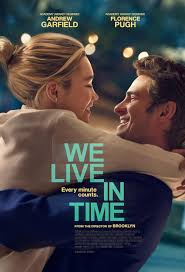
WE LIVE IN TIME
UK, 2024, 108 minutes, Colour.
Andrew Garfield, Florence Pugh, Grace Delaney, Lee Braithwaite, Adam James, Douglas Hodge, Niamh Cusack.
Directed by John Crowley.
We live in time, moment by moment, day by day, year by year, a linear progress. But, in time, we also have the capacity for moving backwards and forwards in our memories.
It is important to note this for this film because rather than the linear progress of a couple meeting, falling in love, having a child, coping with illness, the screenplay moves backwards and forwards, sometimes disconcerting, the audience having to be alert to appreciate at which period in time the action is taking place. Which means that the experience for the audience is not immersive as a linear exposition would offer, but, rather, a variety of responses as we move backwards and forwards in time for insights and comparisons.
And, with living in time meaning from birth to death, this film is very strong in an unusual and sometimes graphic (but happy) birth sequence as well as a contemplation of illness and death.
The film was directed by John Crowley (Brooklyn, The Goldfinch) and gives strong opportunities for performance by the two stars. Andrew Garfield is Tobias, working with Weetabix and its promotion, a strong presence but designed very much to be supportive of Florence Pugh as Almut who, in fact, knocks him down in her car, not the most propitious of meetings. In fact, this is very much Florence Pugh’s film, a strong screen presence as has been shown in a range of films, comedies, dramas and even Marvel Universe actioners, dominating the film, her personality, her moods, her skills as a chef, her pregnancy and the challenge of the birth, her love for her daughter, her having to face serious cancer.
With moving backwards and forwards in time, we do have the opportunity to appreciate Almut’s response to her illness in the light of her previous activities, approaches to life. And, while she is fully alive with her husband and child, her skills as a cook, a chef, are significant, propelling her, even as she is sick, to join in the UK tea, in a chef’s competition in Italy.
The film has a strong female sensibility (though written and directed by men), inviting an empathy with Almut, not always liking her, irritated sometimes with her, but also in admiration of how she deals with life and life challenging situations.
- The title, the focus on time, but not in linear time for the narrative, moving about in time, and themes of time from birth to death?
- The British film, locations, characters, issues? The London sequences, the home and interiors, the grounds? The Italian sequences, the travel, the chef competition? The musical score?
- The effect of the narrative being non-linear, audiences jolted, identifying the time situation? The role of memory, memories and interpretation, understandings of the past? Preparing for the future?
- The bond between Tobias and It? The initial encounter, Tobias and the divorce, upset, being hit by the car, in hospital, the initial encounter with Helmet? Explanations? Each personality? Tobias, the impact of the divorce? Helmet, her parents, the story, skating, family life? As a chef? Seeing her at work, the kitchen, the staff, creativity, with Jade?
- The development of the relationship, Tobias, his work, manner, the meetings with helmet, wanting to depend, time passing, falling in love, the ring in proposal? The bonding together? Families? The issue of children, the disputes?
- The backwards and forwards, the issue of helmets illness, the past, recovery, the recurrence, the effect on her, the consultations, the advice, medical treatment? Success? Failure? Her work, the decision to continue with the cooking, the effect on her, being sick, the issue of the hysterectomy?
- The pregnancy, her working, the effect? Tobias and anxiety? Held up in the traffic, the service station, the attendance, the drama and comedy of the birth? Success?
- The scenes of happy family, their daughter, the playful sequences, the outings? The effect on each of them?
- The decision to carry on with the cooking, the background of her success at the restaurant, Simon and his urging, choosing Jade? The clash with Tobias, his challenges to her, her response, wanting something that her daughter could remember her by? Change of heart, the winning of the UK session, going to Italy, Tobias and the daughter supporting her?
- The symbolic skating, her past championship, Tobias awkward?
- Her death, Tobias and his daughter returning home, the dog, the chicken coop, memories of the past, how to crack eggs?
Sidelined the QB and Me
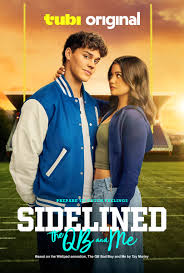
SIDELINED: THE QB AND ME
US, 2024, 99 minutes, Colour.
Sienna Agudong, Noah Beck, Drew Ray TannerL James van der Beek, Deborah Cox, Asia Lizardo, Jason Fernandes.
Directed by Justin Wu.
The screenplay is based on a Wattpad novel, the site where one can read and published original material. And, for non-American or non-football fans, caps QB stands for Quarterback!
This is a film aimed at young audiences in their mid to late teens, both male and female. It may not appeal to younger audiences for whom all this is to come. And, for those over high school age, they may feel they have got over this phase of their life.
The film is quite a pleasant experience for the target audience. The setting is High School, a young student, Dallas (Siena and you don) is in her final school, needing points and a good report to go for a dancing audition for the California arts institution. Her mother, a talented dancer, and her father have been killed in an accident. She lives with her brother who is in a assistant coach at the school. She is very close to her best friend, Gaby.
The other central character is the high school Jock, talented football player, Drayton (Noah Beck), attractive to all the girls, plenty of friends, from a very rich family, James Vanderbeek playing his father who insists on his carrying on the high school tradition of the family going to Waco to play football. Later is revealed there is a family tragedy, Drayton’s twin sister, aged eight, wandering off at a picnic, never seen again. There are issues, of course, of responsibility and feelings of guilt.
In the first class, the conversations about Romeo and Juliet and it being tragic – but, any Shakespeare comparison with this film would be Much Ado about nothing, the clash between the two central characters, situations in which they find themselves, she keeping to herself and resenting him, he attracted to her…
The situations are predictable enough. Her dance teacher tells her she is in her head not experiencing feelings, there is an episode where Dallas and Drayton are urged by the coach to spontaneously respond to each other in dance and movement. She agrees to go to a party with Gabby, drinks, is caught in the situation at Creighton’s house. And they are suspended by the principal for Miss behaviour in going to the party.
Drayton comes to the rescue by inviting Dallas to go to California with him during the suspension, she is in admiration of the dances, he has an interview with the local football coaches.
At a birthday party, a blowup, severity from Drayton’s father, leading to some kind of frank talk and reconciliation, Dallas, on the other hand, secluded, preoccupied with the dance, snapping Gabby, but going to the audition and succeeding.
Final reconciliation is all round, Dallas going to California to dance, and, Drayton not telling her, turning up because of his contract with USC.
All the ingredients for mid and later teenagers to respond to.
Ad Vitam
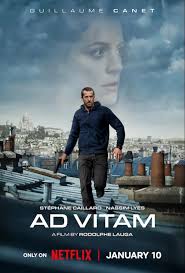
AD VITAM
France, 2025, 98 minutes, Colour.
Guillaume Canet, Stephane Caillard, Nasim Lyes, Zita Hanrot, Alexis Manenti, Johann Heldenbergh.
Directed by Rudolphe Louga.
French actor and director Guillaume Canet, has been popular in French cinema for more than 20 years. Generally, he is a smiling, genial screen presence, a pleasant grinning, appearing in a wide range of films from a Harlen Coben adaptation, Tell No One, to the racing drama, Jappeloup, the recent emotional drama, Hors de Saison.
This time he has contributed to the story which means that he must have had a secret, not so secret, design to step into the tradition of action films like Bruce Willis, Liam Neeson or, even, Jason Statham. And that is what happens here. In fact, it is quite an action show, heating up as it goes along until some of the stunts in the finale defy a realistic belief.
But, it would seem that Guillaume Canet is really enjoying himself as Franck in this different kind of role. Even a sequel?
The film opens spectacularly with men in harnesses on the sides of the Basilica of Montmartre, looking for cracks and crevices. And an attempt on the hero’s life, and a chase through the local streets, leading to an apartment burglary, masked forces , k invadingnocking out the hero and abducting his almost 9 months pregnant wife. So, audiences are in the mood for explanations!
But, the scenario goes back almost 10 years, Franck and his wife, Leo, in the special forces, vigorous scenes of training, celebrations on graduation, and a group of friends who bond over the years. And, they are shown in action, solving cases, tough and expert skills. Until, Franck, enthusiastic, becomes involved in an episode in a hotel, a shootout, his superiors saying he defied orders and therefore was untrustworthy and his dismissal.
And back to that critical situation with the abduction of his wife.
One of the pleasing aspects of the film is it does show the personal lives, family life, of some of Frank’s colleagues, be it and said, as well as his relationship with Leo over the years, her skill in police work, but her delight in being pregnant.
The rest of the review, as for the rest of the film, Franck to the rescue with his friend, Ben, and some heroics all round and chases, on the road as well as in the air…! That in the air part does defy belief but, in the spirit of Francks father’s motto, given to him to uphold, Ad Vitam, to Life, we are swept up in the action.
- The title? Motto? For life? For Armed Forces? For Franck, his father, the baggage and the inscription? Living up to his father, his failure?
- The Paris settings, the landmarks, the views, apartments, politics, police, Secret Service? Domestic sequences and picnics? The abduction, countryside, chases, stunts and special effects? The musical score?
- The structure of the film and its effect, the opening, Montmartre, Franck and Leo? The dangers, the murder attempt, chases, the mystery of the key, the special forces, the assault? Going back 10 years and the establishing of the characters and the situations? The return to the present and the confrontation, the framing, the political background and intrigue?
- The impact of the opening, the work on Montmartre, the climbing, the dancgers, detecting cracks in the building? Climbing skills? Franck, the work, relationship with Leo, her pregnancy? The ransacked apartment, his discussions with Ben? The attempt on his life at Montmartre, the pursuit of the attacker? The attack of the team, the enforcer, masked, the brutality, the threats? The suspense in the flashbacks?
- Franck, his story, his dead father, his tradition, the graduation, Leo and her presence, the other friends, the congratulations, the mood? The many scenes of training and detailed preparation for action? The friendship with Nico, with his wife, the child? The continued friendship, neighbours, picnics and happy occasions? The encounter with Ben, on the top of the building, balancing on the girder? His graduation, alone, Leo talking with him, the celebrations?
- The team, camaraderie, in action, their commander? Leo and her training, the bonding with Franck, two years, together, Nico and his wife conniving?
- All going well, Leo pregnant, the phone call, the diversion to the hotel, Franck’s decision to go in, the others agreeing, the confrontation with the shooters, the deaths, Nico and the pathos of his death? Been wounded?
- The aftermath, Nico and his death, his wife, his children, the support, the boy blaming Franck? The funeral? Franck and his commander, untrustworthy, being dismissed?
- The issue of the blood sample, Franck getting it tested, the revelation of the identity, Secret Service agents? The visualising of the background, the political situation, the arms deal with Australia, the espionage, the shootings, the discussions with the Minister, the cover-up? Franck and the issue of the blood and its identity?
- The team, the Enforcer and his ruthlessness, the confrontation, the brutality towards Leo, bashing Franck, the abduction, secluded Leo, the threats?
- Franck, becoming the action hero, his work on Montmartre, the attempt on his life and his pursuit, the death of his attacker, the enforcer shooting him, the police blaming Franck? His shrewdness, working with Ben, Ben as back up? The phones, identification of place, his shrewd use of the phone? Coming into the forest, taken to the hut, with Leo? Ben’s arrival, the shooting, the range of chases, bikes, cars, shootings, helicopters, audience response to the sudden presence of the flight machine, Franck using it, accuracy, the chases to the maternity hospital, his landing? Leo safe?
- Ben, wounded, driving Leo? The shooting? Franck and his being arrested?
- The journalist, the Minister, the revelations, the scandal, Leo and the baby, Ben to be the godfather, happy ending?
- Popular audience response to this kind of action show with a touch of romance and family?
Wasp, The

THE WASP
UK, 2024, 96 minutes, Colour.
Naomie Harris, Natalie Dormer, Dominic Allburn, Leah Mondesir-Simmonds, O;ivia Juno Cleverly, Rupert Holliday-Evans.
Directed by Guillem Morales.
Audiences who enjoy a 90 minutes psychological thriller will be intrigued by The Wasp. It is basically a two-hander, based on a stage play by Morgan Lloyd Malcolm who adapted the play for the screen. This is a film of very strong dialogue, interactions between two women, gradual revelations of the characters both in the past and in the present.
In the early part of the film, there are scenes outdoors, views of an English city, walking in the streets, visits to a supermarket. However, the main part of the film takes place in the house, in one room in the house. But with the dialogue, the performances of the two actresses, the intriguing developments, the claustrophobic atmosphere, the audience becomes involved and does not notice the limitation of action within the room.
Critics have been very strong in their admiration for the performances by Naomie Harris and Natalie Dormer, British actresses who stro have had ng screen presence in films for almost two decades. Naomie Harris plays Heather, wealthy, seven years married to Simon, his response to her rather brittle, she more sensitive, house proud, but obsessed with a nest of wasps in the house, creating an embarrassing scene during one of Simon’s business socials.
Wasps, with the title, have some symbolic significance, framed photos of wasps on the staircase – and Heather explaining the symbolism of the tarantula wasp, the small wasp inside the tarantula, growing and eating away the spider will it finally emerges free. Which, of course, is the final image of the film.
The two women meet, conspire, but, ultimately remember the past, their childhood friendship, some terrible experiences of bullying and the consequences, and step by step further revelations, twists, continually intriguing, leading up to a battle of wits. And a tribute to the quality of the screenplay which keeps us interested and very much involved.
And, the aftermath of reflecting on each of the women, their experiences, the good and the bad, responsibilities of children, responsibilities of adults, and the consequences of vengeance.
- The focus on wasps, the plague, Simon’s personal interest, the framed pictures? The story of the tarantula wasp in the final images and meaning?
- The British setting, Heather sitting and looking over the city, Carla later sitting in the same place? The overview? The scenes in the street, the supermarket, the women walking to work? But the focus on the house, the main room, the second half of the film within the room, moments upstairs? The musical score?
- Heather, her age, the marriage, Simon and his brittle behaviour, her responses, the issue of the wasps? Her sitting at the mirror, the make up? The social, the guests, Simon’s hopes, Heather and her battering the wasp nest, Simon upset? His ambitions, going out…?
- Heather, on the computer, the files, the contacts, the ironies and revelations about her setting up fictitious characters, entrapment of Simon, entrapment of Carla?
- Heather and the memories of Carla and the rocks for the wounded pigeon? Her decision to contact Carla? Motivations? Meeting with Carla, the restaurant, the proposition, their walking, at the supermarket checkout, the proposition, the money, Carla’s second thought? Pity about the money?
- The portrait of Carla, at the checkout, slovenly, antagonistic towards customers, at home, her children, television, asking permission, her partner sitting in the chair, his gambling? Her going out, being picked up, with James? The money?
- The return to the house, the drama with the two women? Heather, upper-class, Carla, working class, contrasts, the taunts? The proposal, Carla’s acceptance, working on the plan, something in the drink, the weapon for battering, Heather and talking of cutting up the body and disposing of it? The theory of the burglary? protective of her possessions? The time frame?
- Carla’s return, the discussions, Heather and the flashbacks and memories, from the rock and the pigeon, to the various scenes at school, the range of bullying, torment, humiliations, nicknames, Dirty Heather, the scene in the toilet, the physical abuse, the consequences? Heather and the emotional impact of these events, not able to have children, the attempts, IVF, her sense of something within her?
- Drugging Carla, tying her up, telling her the stories? Carla’s story, the abuse at home, that as did Heather knew what was happening her mother, their not intervening? The limitations of children’s experience?
- Carla, the explanations, the viciousness in the past, the behaviour of children, bullying, friends, her apologies, continued attempts?
- Heather going upstairs, the red dress, the knife, Carla’s attempts to be free, the final confrontation, Heather and her bitterness, Carla and the excuses, the revelation about James, his affair with Carla?
- The background with Ruby, the neighbour, looking in the window, , h her mother, Heather putting the letter in the box?
- Heather taunting Carla, the knife, whether to be violent or not, Carla with the knife, stabbing Heather, Simon returning home, tending Heather, Carla watching, Ruby and her mother, giving the letter to Simon, his reading it, Carla with the knife, the audience seeing the letter? Heather and her death and revenge, entrapment of Carla and Simon?
- The final image of the tarantula wasp, the wasp emerging from Heather’s body, her being the tarantula, it way by the wasp which escaped?
Little Something Extra, A/ Un p'tit truc en plus
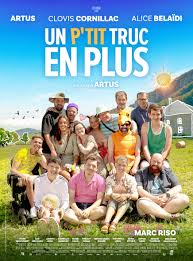
A LITTLE SOMETHING EXTRA/ Un p'tit truc en plus
France, 2024, 99 minutes, Colour.
Artus, Clovis Cornillac, Alice Belaidi, Celine Groussard, Marco Riso, Theophile Leroy.
Directed by Artus.
One of the most popular French films at the local box office in recent years. It is a story of a group of young disabled adults at a summer camp. The care characters are a professional cast. The disabled are themselves, an engaging group and some joyful activities. The complication is that a father and son burglars make their getaway in the group’s bus and are caught up, unwillingly, then willingly, in all the activities.
The film was written and directed by Artists, who also plays the central role of Paul.
- The title, the focus on disabled adults and care for them? And the demand on Paul and his father?
- The great success of the film at the French box office? French sensibilities and sensitivities?
- The cast, Artus as writer, , director performer, comic style, serious? The care cast as professional actors? The disabled cast as themselves, the impact, the effect?
- The situation with the jewel store robbery, the thieves, the satire at parking and getting a ticket and towaway? Desperate situation? The group on the bus?
- The group, disabled, the caring staff, Alice in charge, Marco and his earnestness, Celine and her support? The range of the disabled men and women, characters, personalities, disabilities and coping? The irony of waiting for Sylvain, the mistaken identity for Paul and his father, the real Sylvain going off with the holidaymakers to merrymaking in Spain?
- The expedition, the bonds, going to the Centre, the last year, the centre being sold, Alice and her fiance and the plans for America, the discussions with Celine, the fiance turning up, his insensitivity, leaving?
- Paul and his father and their cover? The relationship between the two, the father dominating his son, the robberies? Paul expecting to be disabled, becoming Sylvain? Abilities, to impersonate, his activities, behaviour, helping the young men, their realising he was not disabled, the issue with Marie and friendships? Eventually his cooking?
- The various personalities, the activities, on the river, the games, friendships?
- Paul’s father, getting the nickname Orpi, tough, having to look after Baptiste, the loss of the ball, searching for him, the gradual bonding, their football discussions, the training? His becoming a surrogate father?
- The happy summer, the bonds between the group?
- The owner, the father threatening him about the sale, calling the police, their having to escape?
- Paul, deciding to give himself up, the attraction to Alice? In the court, his sentence, everybody supporting him, his release, going to work with the group and with Alice?
- The father, turning up, the gift to Baptiste of Rinaldo’s jersey, and his leaving the money to pay for the property?
- One of the best box office successes in French cinema?